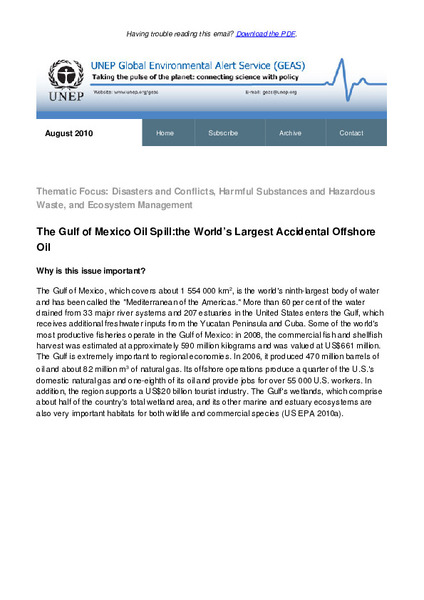The Gulf of Mexico Oil Spill: The World's Largest Accidental Offshore Oil Spill - UNEP Global Environmental Alert Services (GEAS) - August 2010

Date
2010-08Author
United Nations Environment Programme
Citation Tool
Bibliographic Managers
RT Generic T1 The Gulf of Mexico Oil Spill: The World's Largest Accidental Offshore Oil Spill - UNEP Global Environmental Alert Services (GEAS) - August 2010 A1 United Nations Environment Programme YR 2010-08 LK https://wedocs.unep.org/20.500.11822/40778 PB AB TY - GEN T1 - The Gulf of Mexico Oil Spill: The World's Largest Accidental Offshore Oil Spill - UNEP Global Environmental Alert Services (GEAS) - August 2010 AU - United Nations Environment Programme Y1 - 2010-08 UR - https://wedocs.unep.org/20.500.11822/40778 PB - AB - @misc{20.500.11822_40778 author = {United Nations Environment Programme}, title = {The Gulf of Mexico Oil Spill: The World's Largest Accidental Offshore Oil Spill - UNEP Global Environmental Alert Services (GEAS) - August 2010}, year = {2010-08}, abstract = {}, url = {https://wedocs.unep.org/20.500.11822/40778} } @misc{20.500.11822_40778 author = {United Nations Environment Programme}, title = {The Gulf of Mexico Oil Spill: The World's Largest Accidental Offshore Oil Spill - UNEP Global Environmental Alert Services (GEAS) - August 2010}, year = {2010-08}, abstract = {}, url = {https://wedocs.unep.org/20.500.11822/40778} } TY - GEN T1 - The Gulf of Mexico Oil Spill: The World's Largest Accidental Offshore Oil Spill - UNEP Global Environmental Alert Services (GEAS) - August 2010 AU - United Nations Environment Programme UR - https://wedocs.unep.org/20.500.11822/40778 PB - AB -View/Open
Item Statistics
Display item statisticsMetadata
Show full item recordDescription
The Gulf of Mexico, which covers about 1 554 000 km2 , is the world's ninth-largest body of water and has been called the "Mediterranean of the Americas." More than 60 per cent of the water drained from 33 major river systems and 207 estuaries in the United States enters the Gulf, which receives additional freshwater inputs from the Yucatan Peninsula and Cuba. Some of the world's most productive fisheries operate in the Gulf of Mexico: in 2008, the commercial fish and shellfish harvest was estimated at approximately 590 million kilograms and was valued at US$661 million. The Gulf is extremely important to regional economies. In 2006, it produced 470 million barrels of
oil and about 82 million m3 of natural gas.
Collections
Document Viewer
To read more, scroll down below.

